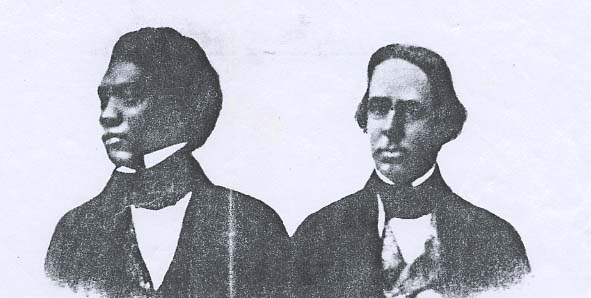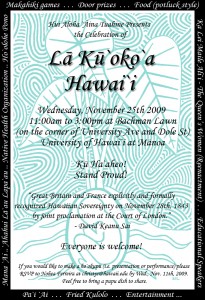La Ku’oko’a
(Hawaiian Independence Day)
November 25, 2009 from 11am to 3pm
University of Hawaiʻi at Mānoa Bachman Lawn (corner of University Ave and Dole St.), Honolulu, Hawaiʻi
Hui Aloha ʻĀina Tuahine
http://tuahine.wordpress.com/
Hawaiian Independence Day
Faced with the problem of foreign encroachment of Hawaiian territory, His Hawaiian Majesty King Kamehameha III deemed it prudent and necessary to dispatch a Hawaiian delegation to the United States and then to Europe with the power to settle alleged difficulties with nations, negotiate treaties and to ultimately secure the recognition of Hawaiian Independence by the major powers of the world. In accordance with this view, Timoteo Ha’alilio, William Richards and Sir George Simpson were commissioned as joint Ministers Plenipotentiary on April 8, 1842. Sir George Simpson, shortly thereafter, left for England, via Alaska and Siberia, while Mr. Ha’alilio and Mr. Richards departed for the United States, via Mexico, on July 8, 1842.
Timoteo Ha’alilio and William Richards:

The Hawaiian delegation, while in the United States of America, secured the assurance of U.S. President Tyler on December 19, 1842 of its recognition of Hawaiian independence, and then proceeded to meet Sir George Simpson in Europe and secure formal recognition by Great Britain and France. On March 17, 1843, King Louis-Phillipe of France recognizes Hawaiian independence at the urging of King Leopold of Belgium, and on April 1, 1843, Lord Aberdeen on behalf of Her Britannic Majesty Queen Victoria, assured the Hawaiian delegation that:
“Her Majesty’s Government was willing and had determined to recognize the independence of the Sandwich Islands under their present sovereign.”
On November 28, 1843, at the Court of London, the British and French Governments entered into a formal agreement of the recognition of Hawaiian independence, with what is called the Anglo-Franco proclamation:
“Her Majesty the Queen of the United Kingdom of Great Britain and Ireland, and His Majesty the King of the French, taking into consideration the existence in the Sandwich [Hawaiian] Islands of a government capable of providing for the regularity of its relations with foreign nations, have thought it right to engage, reciprocally, to consider the Sandwich Islands as an Independent State, and never to take possession, neither directly or under the title of Protectorate, or under any other form, of any part of the territory of which they are composed.
The undersigned, Her Majesty’s Principal Secretary of State of Foreign Affairs, and the Ambassador Extraordinary of His Majesty the King of the French, at the Court of London, being furnished with the necessary powers, hereby declare, in consequence, that their said Majesties take reciprocally that engagement.
In witness whereof the undersigned have signed the present declaration, and have affixed thereto the seal of their arms.
Done in duplicate at London, the 28th day of November, in the year of our Lord, 1843.
[L.S.] Aberdeen
[L.S.] St. Aulaire”
November 28th was thereafter established as an official national holiday to celebrate the recognition of Hawai’i’s independence. As a result of this recognition, the Hawaiian Kingdom entered into treaties with the major nations of the world and had established over ninety legations and consulates in multiple seaports and cities. The Hawaiian Kingdom became the first non-European nation to be admitted into the Family of Nations, while the Ottoman Empire was the first non-Christian nation to be admitted following the Crimean War.
[Historical background provided by D. Keanu Sai. Mahalo.]

